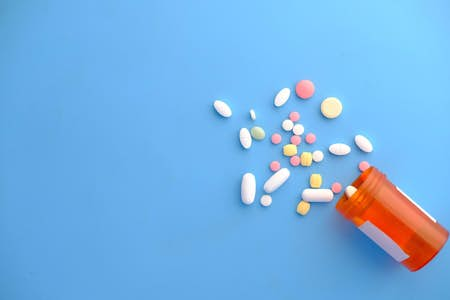Navigating the world of mental health medications can be a complex journey, and for those prescribed sertraline, it's essential to be aware of potential interactions with certain foods. Sertraline, commonly known as Zoloft, is a widely prescribed medication for treating various mood disorders, including depression, anxiety, and obsessive-compulsive disorder.
While it can be highly effective in managing symptoms, understanding how it interacts with different foods is crucial for ensuring its optimal effectiveness and your well-being.
Whether you're looking for the latest vitamins and supplements, want to stock up on over the counter medication, or are looking for a digital solution for your regular prescription, our providers have you covered. Compare brands below and click on your favourite to shop their best offers now!
What is sertraline used for and how does it work?
Sertraline is part of a class of antidepressants called selective serotonin reuptake inhibitors (SSIs). This type of medication works by increasing serotonin levels in your brain. This is an important mood-enhancing chemical, and it helps maintain mental balance.
Available as an oral tablet, you can take this drug for a few different mental health conditions, such as:
- Depression.
- Panic disorder (panic attacks).
- Obsessive-compulsive disorder (OCD).
- Post-traumatic stress disorder (PTSD).
- Social anxiety disorder.
- Premenstrual dysphoric disorder.
- Bulimia nervosa (in some cases).
You should start to feel more relaxed and happy after taking sertraline. However, you may not feel better immediately. It only takes a week for sertraline to build up in your body effectively, but it can take up to six weeks for your body to get used to the drug.
How and when to take sertraline
You'll need to take sertraline at the same time every day, but it doesn't matter when you take it. However, if you experience issues sleeping, take your prescription in the morning. You should take only the recommended dose of sertraline. This is typically 50mg per day, although your doctor may prescribe a lower dose at first and gradually increase it up to 200mg per day.
In addition, you'll need to reduce your dose gradually when coming off sertraline to avoid any adverse effects. You may receive your prescription for this drug under one of sertraline's brand names, such as Lustral or Zoloft.
Side effects of sertraline
Although sertraline is a safe medication, there are a few common side effects to understand. As your body gets used to the drug, you should find that your side effects improve. However, talk to your doctor if they continue to persist.
The most common side effects of sertraline include:
- Nausea.
- Headaches.
- Sleepiness and feeling tired.
- Dizziness.
- Difficulty concentrating.
This medication has a few more serious side effects, such as changes in menstrual periods, like heavy bleeding or spotting. You may also notice some weight gain or weight loss. You may find that sertraline affects your sex life on a long-term basis, with some people experiencing a lower sex drive even after finishing with sertraline tablets.
Serotonin syndrome
Taking sertraline can lead to a dangerous condition called serotonin syndrome. This is a rare side effect of sertraline, and it happens when your body receives too much serotonin. Most commonly, this can happen when you combine sertraline with another medication, causing a harmful drug interaction in the body.
The signs of serotonin syndrome include:
- Fever or shivering.
- Diarrhea.
- Seizures.
- Muscle rigidity.
- Confusion.
Seek medical attention immediately if you experience any of these adverse effects, as you may need to alter your dosage or switch to a different antidepressant medication. Serotonin syndrome can be life-threatening if ignored.
Foods to avoid with sertraline
Though sertraline is generally considered safe, it can interact with specific dietary choices, potentially affecting its absorption, side effects, or overall efficacy. There are a few foods and drinks to avoid when taking this medication to improve your experience of sertraline and reduce the risk of side effects.
Grapefruit juice
It's important to avoid grapefruit juice while taking sertraline because it increases the amount of sertraline your body absorbs. This may, in turn, expand your production of serotonin to dangerous levels, leading to an increased risk of overdose symptoms.
Tyramine-rich foods
Sertraline can also interact with tyramine-rich foods, causing a sudden and dangerous increase in blood pressure. Tyramine is a natural substance derived from the amino acid tyrosine, and you can find it in many common food items.
Tyramine-rich food products include:
- Cured meats.
- Coffee and alcohol.
- Fermented foods, such as kimchi.
- Aged cheeses.
- Excess chocolate.
Speak to your healthcare professional before introducing these products into your diet to maintain healthy blood pressure while taking sertraline.
Sertraline and alcohol
As with many drugs, it's important to think about how alcohol will affect you while taking sertraline. Alcohol may exacerbate any uncomfortable nervous system side effects of sertraline, such as dizziness, drowsiness, and feelings of tiredness. This substance can also worsen your decision-making skills and judgment while taking sertraline.
It's best to wait and see how sertraline affects you before drinking alcohol alongside your prescription. For the same reasons, you should also avoid recreational drugs like cannabis. In particular, illegal stimulants like ecstasy and cocaine can cause dangerous side effects while taking this medication.
Sertraline and caffeine
You may find that caffeine exacerbates sertraline side effects, such as your ability to sleep at night, and consuming them simultaneously can lead to a rapid heartbeat for some people. Coffee is also a high-tyramine food product. As with alcohol, it may be best to wait and see how sertraline affects your body before drinking caffeinated beverages alongside your prescription.
Herbs and supplements
There isn't a lot of medical research about herbal supplements, so it's important to speak to your doctor before taking sertraline with any herbs.
Make sure to avoid St. John's Wort while taking sertraline. This herbal remedy can help with depression but may also increase the risk of sertraline side effects. This is because it increases serotonin production in your brain, leading to dangerously high serotonin levels.
Who can't take sertraline
If you have an underlying medical condition, you may need to use a different antidepressant medication to avoid sertraline interactions or the increased risk of harmful side effects.
You may not be able to take selective serotonin reuptake inhibitors like sertraline if you have the following health conditions:
- Bipolar disorder.
- Haemophilia.
- Epilepsy.
- Type 1 or type 2 diabetes.
- Kidney, liver, or heart problems.
- Narrow-angle glaucoma.
If you're pregnant or breastfeeding, speak to a doctor before taking sertraline. You may not be able to take sertraline during your first three months of pregnancy, but many healthcare professionals think it's safe to take this drug while breastfeeding.
Sertraline and other medications
There are also a few sertraline drug interactions to understand before taking your prescription. These drugs include:
- Pimozide.
- Monoamine oxidase inhibitors (MAOIs) like isocarboxazid and phenelzine.
- Linezolid (intravenous methylene blue).
MAOIs and linezolid can increase the risk of developing serotonin syndrome, a potentially life-threatening condition caused by excessive serotonin in the brain. You must wait 14 days between taking MAOIs and sertraline for this reason.
It's also important to speak to your healthcare provider if you've ever experienced an allergic reaction to any other medications to see if sertraline is safe for you.
Understanding how to take sertraline
Sertraline can help to treat major depressive disorder and manage panic disorder, social anxiety disorder, or obsessive-compulsive disorder. Although this drug is generally considered safe, it’s important to understand how to safely take sertraline and foods to avoid when taking sertraline to reduce any uncomfortable side effects.
Remember that it is essential to nourish your body with a variety of nutrients. Incorporating whole grains, lean proteins, fruits, and vegetables can support overall well-being and help mitigate potential digestive discomfort that you may experience when starting sertraline.�
By following the right precautions, you can ensure sertraline effectively improves your mood and reduces anxiety without lowering your quality of life.
Image Credit: Michelle Leman at Pexels









